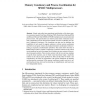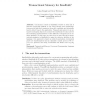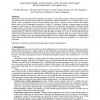ICDCS
1995
IEEE
13 years 7 months ago
1995
IEEE
This paper presents a token-based K-mutual exchsion algorithm. The algorithm uses K tokens and a dynamic forest structure for each token. This structure is used to forward token r...
HIPC
2000
Springer
13 years 8 months ago
2000
Springer
Abstract. Simple and unified non-operational specifications of the three memory consistency models Total Store Ordering (TSO), Partial Store Ordering (PSO), and Relaxed Memory Orde...
SCCC
1999
IEEE
13 years 8 months ago
1999
IEEE
Threads have been present in programming languages for some time now. However, they have a bad image among software developers because they lead to unreliable applications. Most o...
ICS
2003
Tsinghua U.
13 years 9 months ago
2003
Tsinghua U.
Communication latencies within critical sections constitute a major bottleneck in some classes of emerging parallel workloads. In this paper, we argue for the use of Inferentially...
ICDCS
2005
IEEE
13 years 10 months ago
2005
IEEE
The group mutual exclusion problem extends the traditional mutual exclusion problem by associating a type with each critical section. In this problem, processes requesting critica...
SMALLTALK
2007
Springer
13 years 10 months ago
2007
Springer
Concurrency control in Smalltalk is based on locks and is therefore notoriously difficult to use. Even though some implementations provide high-level constructs, these add complexi...
PPOPP
2009
ACM
14 years 4 months ago
2009
ACM
Because data races represent a hard-to-manage class of errors in concurrent programs, numerous approaches to detect them have been proposed and evaluated. We specifically consider...



